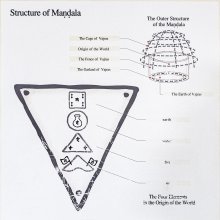Volition: 1 definition
Introduction:
Volition means something in Hinduism, Sanskrit. If you want to know the exact meaning, history, etymology or English translation of this term then check out the descriptions on this page. Add your comment or reference to a book if you want to contribute to this summary article.
Images (photo gallery)
In Hinduism
Yoga (school of philosophy)
Source: ORA: Amanaska (king of all yogas): A Critical Edition and Annotated Translation by Jason BirchVolitions are denoted by the Sanskrit term Saṅkalpa, according to the Amanaska Yoga treatise dealing with meditation, absorption, yogic powers and liberation.—Accordingly, as Īśvara says to Vāmadeva: “[...] [This] extraordinary absorption by which all volition (sarva-saṅkalpa) has been cut off and in which all movement has ceased, is intelligible [only] to oneself and is beyond the scope of words. [...]”.

Yoga is originally considered a branch of Hindu philosophy (astika), but both ancient and modern Yoga combine the physical, mental and spiritual. Yoga teaches various physical techniques also known as āsanas (postures), used for various purposes (eg., meditation, contemplation, relaxation).
See also (Relevant definitions)
Query error!
Full-text (+142): Samkalpa, Cetana, Dilakhushi, Kusalacetana, Manovritti, Adhyavasaya, Saketa Panha, Nama, Sankhara, Ayuhana, Karma, Sankalpavilaya, Ucchinna, Yatna, Managali, Managalitana, Sarvasamkalpa, Samklripti, Dana, Karma Formations.
Relevant text
Search found 160 books and stories containing Volition; (plurals include: Volitions). You can also click to the full overview containing English textual excerpts. Below are direct links for the most relevant articles:
A Discourse on Paticcasamuppada (by Venerable Mahasi Sayadaw)
Chapter 2 - Kammabhava < [Part 8]
Chapter 4 - Distinction Between Sankhara And Kammabhava < [Part 9]
Chapter 3 - Five Causes In The Past < [Part 9]
Patthanuddesa Dipani (by Mahathera Ledi Sayadaw)
Vaisheshika-sutra with Commentary (by Nandalal Sinha)
Sūtra 3.1.19 (Marks of Inference of other Souls) < [Chapter 1 - Of the Marks of Inference]
Sūtra 3.2.3 (Mind is one) < [Chapter 2 - Of the Inference of Soul and Mind]
Sūtra 1.1.6 (Enumeration of Attributes) < [Chapter 1 - Of Substance, Attribute, and Action]
Abhidhamma in Daily Life (by Ashin Janakabhivamsa) (by Ashin Janakabhivamsa)
Part 1 - What Is Kamma? < [Chapter 7 - Kamma]
Factor 4 - Cetana (volition, goodwill) < [Chapter 4 - Cetasikas Associated With Both Good And Bad Cittas (mind)]
Domain 1 - Dana (charity) < [Chapter 6 - Ten domains of meritorious actions (ten punna kiriyavatthu)]
Maha Buddhavamsa—The Great Chronicle of Buddhas (by Ven. Mingun Sayadaw)
Some Remarks on ‘Saddhā’ (faith) < [Chapter 6 - On Pāramitā]
Part 11 - Dependent Origination: Paṭiccasamuppāda < [Chapter 42 - The Dhamma Ratanā]
Notes (a): What Is Morality? < [Chapter 6 - On Pāramitā]
Maha Prajnaparamita Sastra (by Gelongma Karma Migme Chödrön)
2. Actions producing the thirty-two marks (dvātriṃśallakṣaṇa) < [Part 4 - The Bodhisattva in the Abhidharma system]
Part 1 - Definition of generosity (dāna) < [Chapter XIX - The Characteristics of Generosity]
I.1. Definition of generosity (dāna) < [I. Puṇyakriyāvastu consisting of generosity]
Related products

